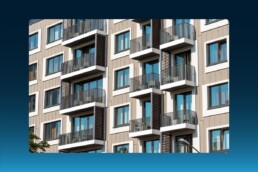So, you have decided to buy a condo. Congratulations! But, did you know that you need a condominium insurance policy for your new place?
It is much different than your standard homeowner’s policy, as there are many differences between owning a condo and a traditional house.
The main difference between homeowners and condo insurance is the amount of property covered by the policies. You could expose yourself and your family to great personal risk if you don’t have enough protection. It is important to read your homeowners association by-laws and understand what the master policy will cover.
Keep reading to learn all you need to know about condominium insurance, and why you need it.
What Is Condominium Insurance?
Condominium insurance coverage, also known as an HO-6 policy, covers condo units. It provides living expense coverage if your condo becomes uninhabitable because of a covered loss..
HO-6 policy protects a condo owner’s belongings. Condo insurance will replace property owned by the unit owner or family members up to the policy limit. Furniture, clothing, electronics, and any other objects not affixed to the unit are examples of covered property.
HO-6 insurance protects your particular unit, while your condominium association’s master policy will protect the building’s exterior and common areas.
What Makes Condominium Insurance Different?
When you buy a condominium, you will become a member of the condo association and will need to pay a monthly fee for it. This charge covers the upkeep of the association’s common grounds.
The cost of maintaining the outside of the condominium structure itself is included in the assessment you pay, in addition to the shared grounds, like walkways and halls.
Insurance accounts for a percentage of that cost. However, please keep in mind that your association only insures the structure’s exterior. In the event of damage, the entire interior, including drywall, flooring, and cabinetry, may be your responsibility. In some cases, you are only responsible for the “betterments and improvements” that have been made to the unit.
This means that it will be on you, as the condo owner, to safeguard your furniture, electronics, and other personal belongings. Furthermore, you could be liable if someone suffers an injury in your dwelling or if something you do causes damages to the shared facilities.
What Protection Does Condo Insurance Offer?
A condominium, or co-op, insurance policy is tailor-fit to your individual needs as a homeowner, including personal property coverage, structural changes to your living space, and additional living expenses as a result of a covered loss.
When choosing condo/co-op insurance, it’s critical to understand what your association’s master policy covers and what you’re responsible for. The lobby, boiler, walkways, basement, and other common facilities are usually covered by your condo/co-op association’s insurance policy.
Condo insurance will cover you for:
Property Protection
A personal condominium/co-op insurance coverage will protect you against losses to your personal belongings and the inside of your unit. As a result, you’ll need to calculate the cost of the following (your agent should be able to assist you with this):
- the expense of repairing or replacing the inside of your home if it suffered damage
- the cost of replacing your home’s contents
To help you replace your lost or damaged property at today’s prices, we propose insuring your personal belongings for their replacement-cost value.
Liability Protection
In addition to your personal belongings, the liability section of your policy protects you from lawsuits for bodily harm or property damage caused to others by you or a family member—and in some situations, pets.
It covers you at home and away, up to the limit of your policy, for both the expense of litigation and any court awards.
Additional Coverage to Consider
There are a few things that are not covered by your condo insurance policy, so you may want to consider additional policies, such as:
Unit Assessment Coverage
As long as the source of loss was covered by the association’s policy, unit assessment coverage will reimburse you for the expenses passed on to you by the association.
Sewer Backup Coverage
Sewer backup coverage protects your home against damage caused by backed-up sewers and drains. However, this does not include flood protection.
Flood or Earthquake Coverage
If you live in a high-risk area, you may need to get extra coverage. As a condition of your mortgage loan, it may be required that you purchase certain supplementary insurances, such as flood insurance.
Floods and earthquakes can happen anywhere, so it’s vital to know your risks and explore your insurance alternatives.
Top Ways to Save on Your Premium
Premiums can seem costly. Here are a few ideas to help you keep your premium costs lower:
- Think about increasing your deductible
- Consider purchasing a home security system
- Replace your outside locks with deadbolts
- Install smoke detectors
- Decide on a payment option that will be made automatically
- Keep an eye on your credit score
- Be sure to inquire about our multi-policy discounts
How Much Condo Insurance Will You Need?
The easiest way to figure out how much condominium insurance you need is to consult with an independent insurance agent. We represent many highly rated insurance carriers, so we are able to shop rates and find the best coverage at the best price!
We recognize that insurance can be a challenge to grasp, but we understand just how vital it is for you to be covered. Contact us, or check out our Blog section for more helpful information.

